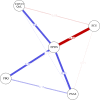Role of self-criticism in postpartum mental health: a network analysis
- PMID: 39276252
- PMCID: PMC11401827
- DOI: 10.1186/s41155-024-00321-2
Role of self-criticism in postpartum mental health: a network analysis
Abstract
Purpose: A significant percentage of women experience psychopathological symptoms during the postpartum period, which can impact not only their mental health and well-being but also the relationship between mother and baby. However, studies investigating how specific psychological factors, such as self-compassion and self-criticism, contribute to the development and maintenance of these symptoms are scarce.
Methods: This cross-sectional study aimed to examine the relationship among compassionate self-responding (CSR), uncompassionate self-responding (USR), maternal mental health indicators, mother-infant bonding, and the perceived impact of the COVID-19 pandemic. Data were collected online from 189 Brazilian women with infants aged 0 to 12 months. Participants completed measures of sociodemographic characteristics, Self-Compassion Scale (SCS), Edinburgh Postnatal Depression Scale (EPDS), Postpartum Specific Anxiety Scale (PSAS-BR-RSF-C), Postpartum Bonding Questionnaire (PBQ), and COVID-19-Impact on Quality of Life (COV19-QoL).
Results: Through network analysis, our findings highlighted that postpartum depression played a central role in the structuring of variables in this system. Furthermore, USR, instead of CSR, emerged as the variable most strongly associated with levels of postpartum depression, which, in turn, was associated with mother-infant bonding.
Conclusion: Mitigating levels of self-criticism in mothers may represent a pathway to prevent the development of postpartum depression, which, in turn, could impact the quality of the mother-infant relationship. Given the significance of the child's early years for their emotional development, intervening early in maternal mental health may be a means to prevent mental disorders in the child as well.
Keywords: Network analysis; Pandemic; Postpartum; Self-compassion; Self-criticism.
© 2024. The Author(s).
Conflict of interest statement
The authors declare that they have no competing interests.
Figures


References
-
- Aoyagi, S. S., Takei, N., Nishimura, T., Nomura, Y., & Tsuchiya, K. J. (2019). Association of late-onset postpartum depression of mothers with expressive language development during infancy and early childhood: The HBC study. PeerJ,7, e6566.y. 10.7717/peerj.6566 10.7717/peerj.6566 - DOI - PMC - PubMed
-
- Arrais, A. D., Mourão, M. A., & Fragalle, B. (2014). O pré-natal psicológico como programa de prevenção à depressão pós-parto [Psychological prenatal care as a prevention program for postpartum depression]. Saúde e Sociedade,23(1), 251–264. 10.1590/S0104-12902014000100020 10.1590/S0104-12902014000100020 - DOI
LinkOut - more resources
Full Text Sources
